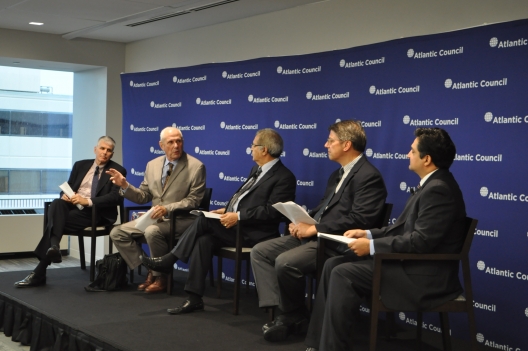 The Atlantic Council’s Dinu Patriciu Eurasia Center and the Central Asia Caucasus Institute held a vibrant discussion with Afghanistan’s Central Bank Governor Noorullah Delawari on the new transit and trade infrastructure that is debuting across Eurasia: the New Silk Road. This new commercial architecture aims to support Afghanistan’s economic, political, and security transitions by developing trade connections with its neighbors in South and Central Asia and through them to markets beyond. With leading experts from the Afghan and US governments, as well as the international community, this event reviewed progress since then-US Secretary of State Hillary Clinton’s call for a new Silk Road in July 2011 and discussed new priorities and challenges ahead as Afghanistan seeks to become a regional hub at the crossroads of Eurasia. Participants touched on opportunities for the private sector to help drive development in the region.
The Atlantic Council’s Dinu Patriciu Eurasia Center and the Central Asia Caucasus Institute held a vibrant discussion with Afghanistan’s Central Bank Governor Noorullah Delawari on the new transit and trade infrastructure that is debuting across Eurasia: the New Silk Road. This new commercial architecture aims to support Afghanistan’s economic, political, and security transitions by developing trade connections with its neighbors in South and Central Asia and through them to markets beyond. With leading experts from the Afghan and US governments, as well as the international community, this event reviewed progress since then-US Secretary of State Hillary Clinton’s call for a new Silk Road in July 2011 and discussed new priorities and challenges ahead as Afghanistan seeks to become a regional hub at the crossroads of Eurasia. Participants touched on opportunities for the private sector to help drive development in the region.
Related Content |
The Central Asia-Caucasus Institute is a primary institution in the United States for the study of the Caucasus, Central Asia and the Caspian Region. The Institute, affiliated with Johns Hopkins University-SAIS, forms part of a Joint Center with the Silk Road Studies Program, affiliated with the Stockholm-based Institute for Security and Development Policy.
The Atlantic Council has a long track record of work on and engagement with Central Asia and the Caucasus on issues ranging from transatlantic security to economic integration and energy security. President and CEO Frederick Kempe announced in July 2013 with Kazakh Foreign Minister Erlan Idrissov a new project on Eurasian trade and economic development that aims to bolster trade ties with and within the region and strategies to ensure that new transit and trade infrastructure contributes to economic growth and prosperity.
